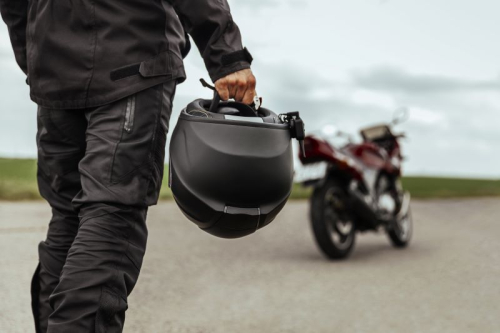
This year RoadSafe Hawke’s Bay, Hawke’s Bay Regional Council and ACC Injury Prevention have partnered together to introduce a trial of a motorcycle crash card.
Liz Schlierike, Hawke’s Bay Regional Council Road Safety Engagement Advisor, says motorcycle crashes can be high impact and cause serious injury. “Fast and effective treatment is crucial to saving lives and this is where a motorcycle crash card can come in.”
Motorcycle crash cards are self-laminated cards that motorcyclists and passengers can place in their helmets.
The idea was invented overseas to be used by medical professionals and first responders who attend motorcycle crashes. The card details a rider’s specific medical history when the rider is unable to communicate.
“These cards are an effective communication tool as often a crashed rider’s mobile phone is locked or broken, or their wallets are unable to be located” says Ms. Schlierike. “Valuable time can be saved finding out specific health information including blood type or allergies to certain medication.”
Cards are designed to be free for any motorcycle rider to obtain.
To use the card, the rider fills out the form with their personal details, emergency contact information and any health conditions and places it in the lining of their helmet.
A highly visible red sticker is placed on the outside of a helmet to indicate there is a Crash Card inside.
In the event of a crash, professionally trained first responders can safely remove the rider’s helmet to access the card for vital details that could save their life.
Hawke’s Bay Regional Council, RoadSafe Hawke’s Bay and ACC Injury Prevention are trialling this initiative. The timeline and details of the trial are:
It’s not too late to join, if you, or someone you know, would like to take part in this trial, get in touch with RoadSafe Hawke’s Bay on roadsafe@hbrc.govt.nz.
The crash card initiative was created and is still being delivered in the United Kingdom by Ian Burrell who is a motorcycle paramedic and the Chief Motorcycle Instructor and Managing Director of Pass Bike in the UK. Find out more on the Crash Card UK website.
The concept is also being used worldwide by countries like the United States, Sweden, Finland, Portugal, Romania and Northern Ireland under the name Rider Alert. Read more about the international Rider Alert initiative.
Motorcycles make up only 3% of the vehicle fleet in New Zealand but motorcycle accidents make up 20% of Accident Compensation Corporations (ACCs) outstanding claims liability (OCL).
The number of registered motorcycles and mopeds is continuing to increase. In 2016, the New Zealand Transport Agency (NZTA) statistics indicated there were 168,632 registered motorcycles and mopeds in New Zealand. By 31 July 2019, this number had increased to 187,717.
The risk of death or injury to a motorcyclist in a crash is 21 times higher than a car driver travelling over the same distance.
In 2021 Waka Kotahi NZTA recorded 22,913 road vehicle crashes – 282 fatal crashes (where 319 people died) and 2,181 serious injuries. 1,522 motorcycle crashes, 47 deaths and 489 serious injured.
A search on Waka Kotahi’s Crash Analysis System (CAS) showed there had been 58 motorcycle crashes in Hawke’s Bay between in 2021:
27 February 2024
Disclaimers and Copyright
While every endeavour has been taken by the to ensure that the information on this website is
accurate and up to date, shall not be liable for any loss suffered through the use, directly or indirectly, of information on this website. Information contained has been assembled in good faith.
Some of the information available in this site is from the New Zealand Public domain and supplied by relevant
government agencies. cannot accept any liability for its accuracy or content.
Portions of the information and material on this site, including , pages, documents, online
graphics and images are protected by copyright, unless specifically notified to the contrary. Externally sourced
information or material is copyright to the respective provider.
© - www.roadsafehb.or.nz / +64 6 835 2633 / roadsafe@hbrc.govt.nz